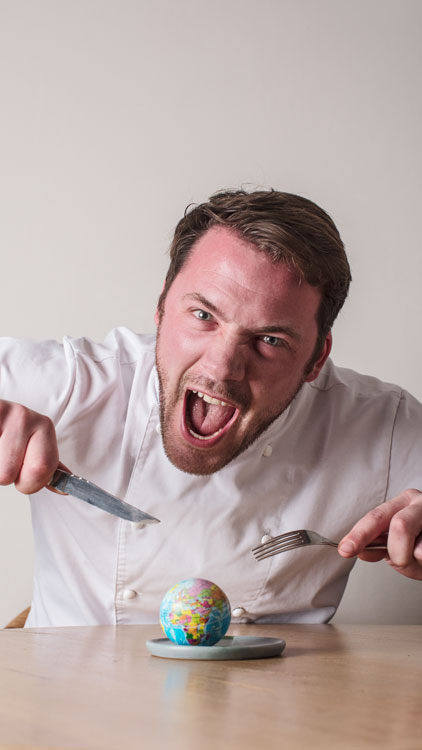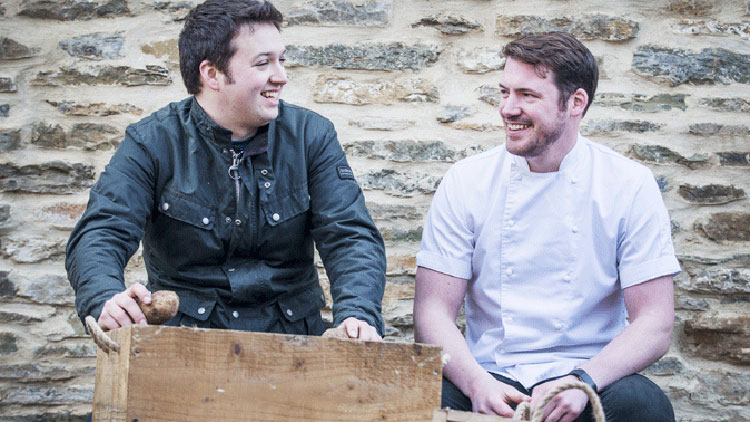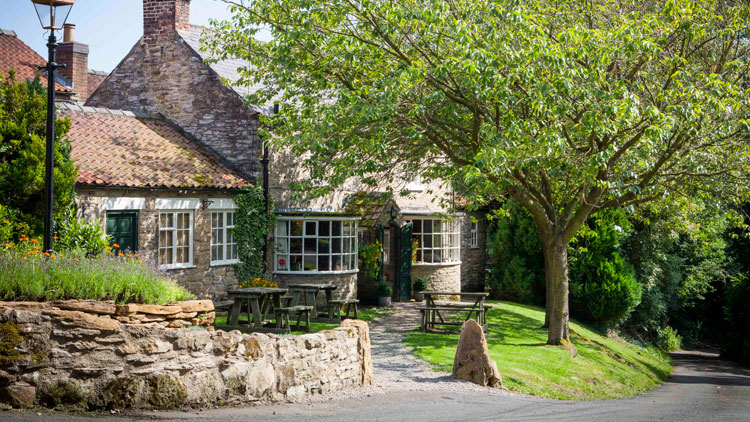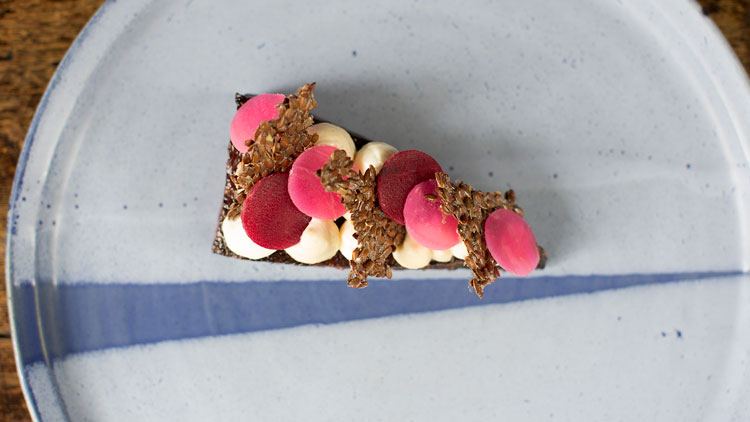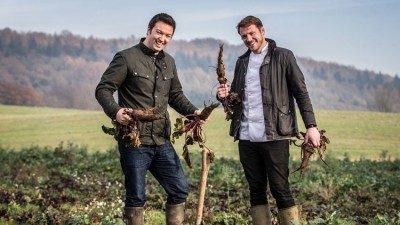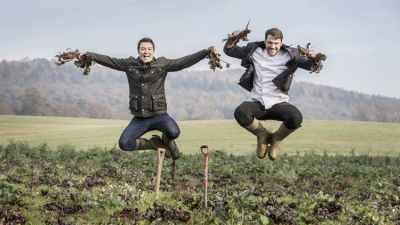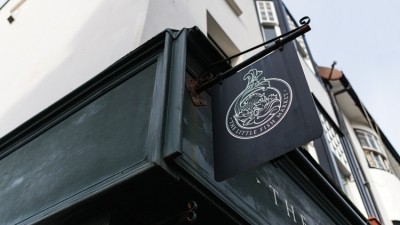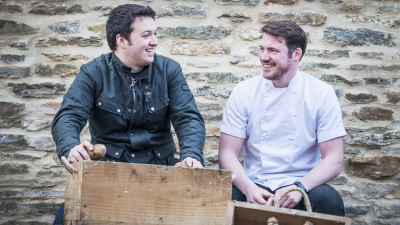On top of the world: The Black Swan at Oldstead
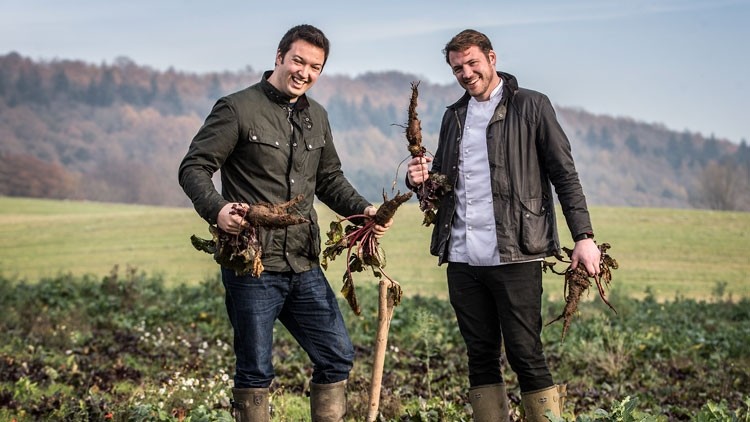
In the far corner of the bar area at The Black Swan at Oldstead an owl peers out from behind four ceramic pots. It is the TripAdvisor logo, stamped onto a framed certificate that sits hidden on a shelf, barely noticeable to anyone in the room. Even chef-patron Tommy Banks wasn’t aware of its existence until I point it out to him, with it obviously having been placed there by another member of the team.
This usually wouldn’t seem odd: rarely would a Michelin-starred restaurant make obvious reference to TripAdvisor, the customer review website that is the scourge of chefs and critics across the world. But this is different. In October TripAdvisor named The Black Swan at Oldstead the best restaurant in the world, knocking Spanish three-star restaurant Martín Berasategui, no less, off the top spot. And the phones haven’t stopped ringing since.
Banks and I are sitting in the downstairs bar area of the pub-turned-restaurant he and his family have run since 2006. The low afternoon sun streams through the window and lights up the face of the animated 28 year-old as he talks.
He is confident and relaxed when discussing the family business, the challenges of running a restaurant in a village “which is literally not on the road to anywhere” and the pressures he has faced as a chef from an early age – more on all of that later – but he gets a little sheepish when the conversation turns to TripAdvisor and the award. Having such an accolade thrust upon the family business was not something he expected, and neither has been the publicity it has garnered, he admits coyly.
Overnight The Black Swan went from being a North Yorkshire restaurant with a good reputation among the more well-travelled UK gastronomes to a place people across the world were getting in a froth about.
US TV stations came knocking, Indian newspapers covered the story and there was even an early day motion in parliament congratulating the family. Two weeks before the announcement, the restaurant was only fully booked on a Saturday night; now it is full for every service and receives some 700 daily email requests for a table.
And yet it is an award that people have been quick to disparage. “So we’re listening to ShitAdvisor now, are we?,” tweeted Marina O’Loughlin on hearing the news. Jay Rayner went onto the social media site to ask “PR for
@BlkSwanOldstead puts out release declaring them best restaurant in world according to TripAdvisor. Do they really think they are?” (answer: no, Banks doesn’t regard his family’s restaurant as the best in the world and is tired of journalists assuming he does, even though he is too polite to say so).
“We didn’t ask for it, but then we had to react to it,” says Banks, with the air of someone who has won the lottery but with someone else’s ticket. “A few critics have said nasty things about it, but what would you do? You’ve got to milk it for all it’s worth.
"We were really struggling.
I went on Great British Menu
knowing if I was a success we
might be OK, but if I failed
that was our final chance"
“The thing I’m most pleased about is that it is [an award] based on opinions of people who have genuinely been to The Black Swan and enjoyed it. It is good recognition that such a high percentage of people who eat here love it.”
That said, he’s not blind to the fact that such an accolade is a double-edged sword, particularly when its has been voted for by the capricious dining public rather than respected gourmands or inspectors.
“The second question people ask me [after, ‘why are you the best restaurant in the world?’] is ‘how will you cope with people’s higher expectations?’ he sighs. “We’re just
going to do what we’ve always done”. It’s not an award he expects to win again though.
“With higher expectations we are more likely to get bad reviews.”
SO HOW DID A RESTAURANT IN THE MIDDLE OF NOWHERE BECOME RATED THE BEST IN THE WORLD? The story begins in 2006 when the Banks family took on their “pretty bad” local pub – they live 100 yards up the road from it – to give it a new lease of life. Tommy, who was just 17 at the time, was put in the kitchen despite having no cooking experience while his older brother James ran front of house – as he still does today.
It wasn’t an auspicious start, with the UK being plunged into a recession a year later and for a long while the business struggled to find its feet, but the family was determined to put The Black Swan on the culinary map.
Banks recalls reading advice from Marco Pierre White when he was running his Wandsworth restaurant Harveys in a recession two decades before, that the top end of the market will survive. With that ringing in his ears they put their prices up. “It was a bold move and people didn’t come,” he admits, “but we just about survived.”
This focus on quality would eventually pay off, with then head chef Adam Jackson winning the restaurant a Michelin star in 2011, but even then it wasn’t the saving grace they had hoped for.
“Business at that stage wasn’t great. The only customers who came were because we had a star, but there weren’t enough of them,” says Banks, admitting that he had no knowledge of Michelin before the accolade.
It was only when Jackson left two years later and Banks was put in charge of the kitchen that the restaurant started to resemble the world-conquering place that it is today, but even then things weren’t straightforward.
At just 24-years-old and with no proper training, Banks found himself having to cope with the pressure of retaining a precious Michelin star, without which he is convinced The Black Swan would have failed. For the five months before the new guide came out he worked practically every single day, conscious that the future of his family’s business rested on his shoulders.
"Location has been a challenge
for us for 10 years but,
over time, we've turned
that into a positive"
“If we’d lost [the star] I don’t think we’d have survived. It was a really weird time because I was 24 and hadn’t cooked anywhere else. But when Adam left I wanted to change the menu completely; I didn’t cook a single dish of his. But how do you have a style as a young chef with not much experience?”
Banks found the answer in cookbooks, plundering the likes of Phil Howard’s The Square and Eleven Madison Park The Cookbook. “The food was delicious but the style was all over the place and it had no soul. It was great in one sense as it helped us retain the star, but it wasn’t my cooking.”
By this point Banks had already decided this wasn’t the culinary approach he wanted to take, but it was a comment from a journalist that proved the real catalyst for change. “One reporter asked what it felt like to have reached the pinnacle of my career and it felt wrong. I wasn’t even that good at cooking – I still don’t regard myself as a technical wizard in the kitchen – and it wasn’t my food. That’s when the real change happened.”
ALTHOUGH THE BUILDING MIGHT BE THE SAME, THE BLACK SWAN OF TODAY IS BARELY RECOGNISABLE TO THE PUB OF OLD. Banks’ food is now very much of its location, with the restaurant attempting to only serve ingredients grown in its grounds or that have been foraged by its chefs (meat comes from local farms).
Banks admits that such a strict rule is “a little ridiculous” but only after he imposed it did he start to unlock his latent creativity. “You have to be creative to work to those restrictions. That was a turning point.”
For the first year the restaurant initially served a la carte as well as a tasting menu, but only using home grown produce proved too prohibitive for a 5/5/5 menu, and this was later dropped. He also dramatically cut trading hours, no longer opening for lunch Thursday through Sunday but instead just for lunch on a Saturday, ostensibly turning what was once a pub into a restaurant. This, he says, gave the chefs more time to develop dishes, although it wasn’t great for the balance sheet.
“It was terrible for the business and nearly bankrupted us,” he says with a smile only afforded by hindsight. “We were still not busy but I wanted to push things forward. It was a big risk.”
Retaining the star and the change of direction helped mould The Black Swan into the restaurant it is today, but Banks ultimately places its success on his appearance on BBC’s Great British Menu (GBM) in 2016. Sitting in a restaurant that is fully booked for three months in advance – as are its nine bedrooms – it’s hard to believe The Black Swan’s fate rested on a TV programme. Yet Banks is unequivocal on this point.
“We had been open for 10 years and were really struggling. I went there knowing that if I was a success we might be OK, but if I failed that was our final chance. Other chefs had good jobs and wanted to do well for themselves but I had to win for the business. There was just too much riding on it.”
And thus it proved to be. Banks was a runaway success, with his mackerel dish being served at a banquet at the House of Commons. Yet it was for his dessert ‘My Great Briton’, inspired by his late grandfather, that he really found fame.
The dish of Douglas Fir parfait with lemon verbena gel featured a bonzai tree and the voice of his grandfather and took inspiration from the nearby White Horse of Kilburn beauty spot.
Visitors to the spot are greeted with a information box, and when they press a button the recorded voice of Banks’ grandfather tells the story of the White Horse. There’s something very satisfying in the fact that the family’s business success is traced all the way back to the grandfather.
“GBM put us on the map. Winning it changed our lives. Having the financial burden and not knowing if you can pay wages is incredibly stressful, and it changed all that. Suddenly the restaurant was full.”
DINERS HOPING TO HAVE A TASTE OF BANKS’ 2016 GBM DISHES WILL BE DISAPPOINTED. While the programme had a hand in helping The Black Swan get to where it is today, it doesn’t hold any sway over the menu.
“A lot of chefs fall into the trap of getting famous for a dish and then having it on the menu all the time. I’m not keen on doing that, it would hold me back.”
His winning dish of turbot with strawberries and cream the following year, for example, wouldn’t comply with Banks’ seasonal cooking policy, although it’s one that doesn’t prohibit him from serving ingredients that are technically out of season.
Banks describes his cooking as seasonal, but he does not cook around the seasons, an approach he addresses in his new cookbook Roots, published next year.
“When you start farming you realise that a lot ingredients on menus aren’t truly seasonal. In April and May you start to see spring vegetables like broad beans and peas on menus, but they are not really ready until the end of June.
“In April I don’t have anything but last year’s stored veg and Yorkshire rhubarb. Even at the start of June I’m still using winter produce.” He refers to the first six months of the year as the hunger gap. July to September is a time of abundance, and the final months of the year the preserving season.
Banks is proficient in clamping vegetables, a time-old method of preserving them in straw and soil, as well as pickling. He then serves food that he has stored all year round.
“Our beetroot is harvested in October but served in May. It was preserved in season, but it is not in season. And we don’t use elderflower in the summer because I want to process it all and use it in winter. Is my food seasonal or not?”
He admits he likes to use ingredients that are less common, and favours the winter months when chefs have to work harder to make home grown dishes more interesting. “At the height of summer, it’s a bit boring, you’re cooking what everyone else is – beans peas, tomatoes, courgettes. In winter things are much more interesting.”
Back to that beetroot, which has reluctantly become The Black Swan’s signature dish (“I never wanted a signature dish, it holds you back”) and one that is available all year round – that’s the intention at least.
The dish of Crapaudine beetroot, also known as toad beetroot because of its thick, gnarled skin, is cut into steaks and slowly cooked in beef fat and has become a firm Instagram favourite.
“The first year we grew so many that we harvested them in September and still had some left over a year later. So the idea is to sow them once a year, harvest them once a year and serve them to every customer.” Banks has planted three acres of the crop, which would have been enough but, following the TripAdvisor award, might not be.
Being able to grow large amounts of crops comes with its advantages. Banks likes to experiment and makes his own black garlic – made by keeping it in a chamber at 60°C for six weeks – which he then turns into a paste and paints onto venison for one of his dishes. He’s now started doing the same with apples, which acquire a strong umami flavour “not dissimilar to prunes” as they blacken, and which are an element of his new apple tarte tatin.
Certain crops he can grow himself and give him an edge, such as serving sweetcorn picked just hours before service. “As soon as you remove corn on the cob from the plant the sugar starts to turn to starch so the sooner you eat it after it is picked the better.”
But there are obvious disadvantages too. His plans to serve a sweetcorn tart for two months were scuppered when only two of the five sweetcorn crops turned out to be any good. As this illustrates, Banks isn’t growing his own produce as a cost-cutting exercise. “It’s quite expensive growing crops that fail. People think you make money as you don’t have to buy them, but it is more expensive to grow on a small scale.
“Only one in five Crapaudine beetroot seeds germinate so no farmer would take that on. As a commercial crop it is useless. Farmers don’t grow for flavour they grow for yield, and that’s understandable. But as a restaurant you approach it totally differently.”
THE BLACK SWAN ISN’T THE ONLY UK RESTAURANT TO GROW MUCH OF ITS OWN PRODUCE, but it has more of an affinity with a restaurant slightly further afield: Faviken, Magnus Nilsson’s restaurant in the wilds of Sweden.
“One of the draws of Faviken is that it is in the middle of nowhere. Going there is almost a pilgrimage. I felt a kindred spirit with Magnus, that he was in the middle of nowhere, as we are.
“Location has been a challenge for us for 10 years but over time we’ve turned that into a positive – people now want to come here. Of course, Magnus is a lot more out of the way than we are. We’re 15 minutes from the A19, for him it’s over a mountain to the nearest road.”
Like Nilsson, who recently announced he had tripled the size of his team over the past two years and cut staff hours from an average of 80 to 40-45 a week in the process, Banks has also made changes to his operation. Two of his 14-strong brigade (including himself) do the breakfast shift and then work on production all day before leaving before dinner service. The rest of the team start at midday. However, he acknowledges this is a luxury only afforded to full restaurants.
“We used to work 16 hours a day like everyone else but the industry is changing and we have cut our working hours. If we had done that from the start we wouldn’t be here today, but now we’re busy we can afford to do that. It’s difficult for restaurants that are struggling, but you’ve got to change the industry for the better.”
With this in mind, the Banks family made the decision to only open two of its three dining rooms on Monday to Wednesday, as well as only do one lunch service a week, despite being able to fill all three rooms for lunch and dinner each day twice over.
“We’ve got lots of people wanting a table but we’re taking it steady. We’ve not gone for 10 years and not made any money just to then try and push it too far and cash in now that we are inundated with bookings.”
That might keep the TripAdvisor fraternity happy for another year.
